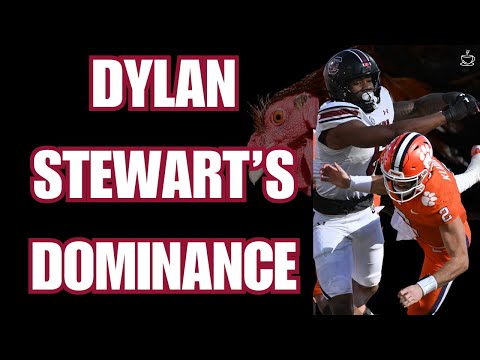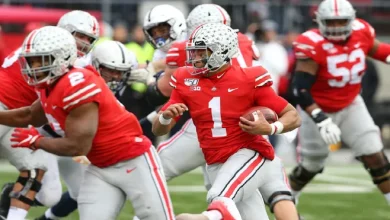Dylan Stewart chose loyalty and development over lucrative NIL deals, prioritizing his growth and commitment to South Carolina over financial gain.

In the rapidly evolving landscape of college sports, Name, Image, and Likeness (NIL) deals have become a defining factor influencing athletes’ decisions about their futures. For many, these lucrative opportunities provide financial security and recognition, sometimes even outweighing the traditional values of loyalty, growth, and education. However, Dylan Stewart’s recent choice to remain committed to South Carolina, despite the allure of massive NIL deals elsewhere, highlights a different perspective—one rooted in loyalty, personal development, and long-term vision.
Understanding the Context: The Rise of NIL Deals
The NCAA’s adoption of NIL rights in 2021 revolutionized college athletics. Student-athletes could now monetize their fame and reputation, leading to a surge in endorsement deals, sponsorships, and business opportunities. For many athletes, NIL deals have become a significant source of income, often surpassing their athletic scholarships and providing financial independence at a young age.
This shift has sparked debates about the true motives behind athletes’ decisions—whether they are driven by passion for their sport, loyalty to their school, or immediate financial gains. Some athletes have transferred schools solely for better NIL opportunities, viewing college as a stepping stone rather than a place for personal and athletic development.
Dylan Stewart’s Background and Athletic Journey
Dylan Stewart, a highly talented defensive end, committed to South Carolina because of the program’s reputation, coaching staff, and his genuine belief in the school’s vision for his future. From early on, Stewart demonstrated exceptional talent and leadership qualities, making him a sought-after recruit in the college football landscape.
Choosing South Carolina was not merely about playing at a competitive level but about becoming part of a community that valued growth, resilience, and integrity. Stewart’s decision to stay committed to the Gamecocks reflects a broader understanding of what it takes to succeed both on and off the field.
The Temptation of Big NIL Deals
In recent seasons, Stewart received multiple offers from agencies and brands eager to partner with him, promising significant financial rewards. These deals ranged from local endorsements to national campaigns, which could have provided immediate monetary benefits exceeding his college scholarship value.
The temptation to capitalize on these opportunities is understandable. Young athletes often face pressure to maximize their earning potential early, especially when they see peers transferring or signing lucrative deals. For Stewart, the decision was not just about money but about what his loyalty and growth mean in the long run.
Loyalty to South Carolina and Personal Values
Stewart’s choice to stay at South Carolina underscores a deep sense of loyalty—toward his teammates, coaches, university, and himself. Loyalty in collegiate athletics is often underestimated but remains fundamental to building a strong team culture and community.
By remaining at South Carolina, Stewart emphasizes that his development as a player and person is more important than immediate financial gains. He understands that the college environment is designed to foster growth, education, and resilience—traits that cannot be bought with NIL deals.
Furthermore, Stewart’s decision reflects his personal values. He prioritizes integrity and long-term success over short-term monetary benefits. Choosing to stay demonstrates a belief that his current environment will better prepare him for future professional endeavors, whether in the NFL or beyond.
Development Over Dollars: The Long-Term Perspective
One of the core reasons for Stewart’s decision is his focus on development. College football offers a unique platform for athletes to hone their skills, learn from experienced coaches, and grow both athletically and personally.
Stewart recognizes that jumping ship for a bigger NIL deal might bring immediate financial rewards, but it could also disrupt his growth trajectory. Transferring schools often means adapting to new systems, coaches, and teammates, which could hinder his progress.
By staying at South Carolina, Stewart maintains stability, continuity, and the opportunity to improve under familiar coaching staff and team dynamics. This approach aligns with a long-term perspective—viewing his college career as a foundation for future success, whether in professional sports or life beyond.
The Role of Education and Personal Growth
Another vital aspect of Stewart’s decision is the emphasis on education. College is not solely about athletic achievement; it’s also about earning a degree, gaining life skills, and preparing for a future beyond sports.
Stewart’s choice to remain at South Carolina signals his commitment to completing his education and developing holistically. Many athletes who prioritize NIL deals might overlook the importance of academic and personal growth, risking their future stability for short-term gains.
The Impact of Loyalty on Team Dynamics and Culture
Loyalty fosters trust and cohesion within a team. Stewart’s decision sets an example for his teammates and future recruits, emphasizing that dedication and perseverance matter more than immediate financial incentives.
This attitude can strengthen team culture, promote unity, and inspire others to prioritize collective success over individual gains. It also demonstrates to the coaching staff that Stewart values the program and is committed to its long-term success.
Balancing NIL Opportunities and Loyalty
While Stewart chose loyalty over lucrative NIL deals, it’s essential to recognize that this decision is personal and not universally applicable. Many athletes successfully balance NIL opportunities with their commitments, leveraging their platforms to benefit both themselves and their programs.
Stewart’s case highlights that athletes can make conscious choices aligning with their values and future goals. It also underscores the importance of institutions supporting student-athletes in making informed decisions that balance financial opportunities with personal development.
The Broader Message: Values in College Athletics
Stewart’s decision sends a powerful message about the values that should underpin collegiate sports. Loyalty, integrity, growth, and education are core principles that can sometimes be overshadowed by the allure of quick financial gains.
This stance encourages a reevaluation of priorities, emphasizing that athletic and personal development often outweigh immediate monetary benefits. It also advocates for a more sustainable approach to college sports, where athletes are encouraged to build their careers on a foundation of loyalty and perseverance.
A Model for Future Athletes
Dylan Stewart’s choice to turn down massive NIL deals in favor of staying at South Carolina exemplifies a commitment to core values that transcend monetary considerations. His decision underscores the importance of loyalty, personal growth, and long-term vision in college athletics.
As NIL opportunities continue to grow, Stewart’s example serves as a reminder that success is not solely measured by immediate financial gains but also by integrity, dedication, and the pursuit of excellence. Athletes, coaches, and programs alike can learn from his approach—prioritizing character and development to build a lasting legacy in college sports.









